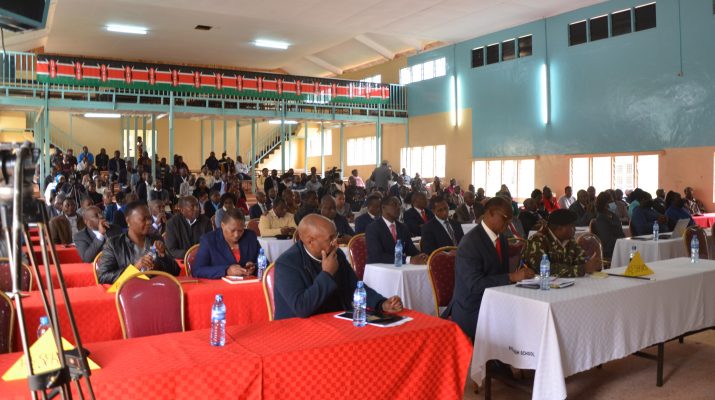Education stakeholders from Nyeri have submitted their views to the Presidential Working Party on Education Reforms with some calling for comprehensive changes to the Competency-Based Curriculum (CBC) to ensure it is in tandem with the country’s needs.
While there was general consensus to retain the model, there were calls for the transition of learners from Grade Six to Junior Secondary School (JSS) early next year to be halted until the Government puts up sufficient physical infrastructure to accommodate the more than 1.2 million learners.
County Education Board chairperson Nderitu Gichuki told the team led by Purity Karabai Mbaabu that secondary schools are currently strained due to the 100 per cent transition requirement and therefore they may not be in a position to accommodate the new learners.
“A 100 percent transition over the years put a strain on Secondary Schools’ infrastructural needs and the recent construction of one, two or CBC classes was therefore only a drop in the ocean. As such Secondary schools are ill-prepared to absorb all the current grade six learners in January 2023. By the year 2026 three classrooms per stream in the current primary school will not be in use and to us this is a waste of resources,” he told the team.
The board has therefore recommended a temporary pause to the transition for at least a year to enable secondary schools to put up the required infrastructure before the learners can be admitted.
Besides, they want a reduction of the 12 subjects under the CBC system collapsed into fewer subjects for ease of implementation akin to the now defunct Certificate of Primary Education which had only three examinable papers.
Cyrus Wachira, who is the County Secondary Schools Heads Association (Kessha) chair, has proposed the reformation of the evaluation method in the country through decentralization of the Kenya National Examinations Council operations.
Wachira proposed that by bringing the national examination body’s activities closer to the community, it would be easier to evaluate individual learners’ performance and ensure such tests meet the required quality standards.
“We recommend the decentralization of Kenya National Examinations Council functions to the county level to enable the body to know what is happening with the CBC. This will help in regard to quality assessment of our exams and the kind of results we are going to get at the end of it all,” he pointed out.
The association has however defended the upcoming Grade Six transition to Junior Secondary School next year noting that both private and public secondary schools have proper facilities to cater for the new students including fully equipped laboratories.
Mathira Bodaboda Association Chair Boniface Gachanja has challenged tertiary institutions of learning to open up space for more learners by introducing short-term courses that do not require high grades.
He said such a move will enable more Kenyans, including those who never made it to secondary school to pursue short courses such as on Life Skills that will help them in their day-to-day living.
Gachanja also proposed the introduction of a common university students’ official uniform just like in the Medical Training Centers as one way of instilling decency and uniformity in public institutions.
“We as Bodaboda riders wish to challenge University to create a symbiotic relationship with the immediate community by offering short and affordable courses that can help empower low-income earners with vital skills in practical areas such as firefighting and Disaster Management. Such courses besides providing skills to the learner will also build good neighborliness between the community and the institution offering the skills,” stressed Gachanja.
Karatina University also presented its memorandum highlighting among others funding gaps, lack of proper technology, infrastructure deficit and inadequate public sensitization as among key areas facing CBC implementation.
In the proposal signed by the institution’s Vice-Chancellor Professor Mucai Muchiri, the university termed the CBC implementation as too expensive for the country and therefore called on the State to shoulder the attendant costs.
The facility also asked the government to consider all funding to public universities be handled by the University Funding Board and such monies be channeled directly to the universities.
“Budgetary allocation from the Exchequer should be sufficient for universities to deliver their core mandate. Basic education should be fully funded and no fees are to be charged on parents while all funding to universities should be handled by the University Funding Board and funding of students to be remitted directly to the universities,” read part of the memo.
The 42-member task force was appointed by President William Ruto on September 30 this year to evaluate the country’s Education system and come up with recommendations needed to align the education system with the country’s needs.
The team began conducting public participation forums on November 1 and will conclude its tours on November 11 after touring all 47 counties. The team is chaired by university don Professor Raphael Munavu.
Members of the public can forward their views to the task force either in writing or verbally as per the Kenya Gazette Notice No.11920 notice posted last Friday.

